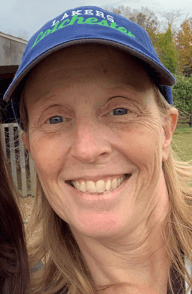 May is mental health awareness month and that’s a pretty big, broad, and personal topic. So many of us have been affected by our own mental health struggles or the struggles of those close to us, particularly since the COVID pandemic. Here, I share four key learnings based on my personal experience as a caregiver and supporter. Years ago, I did not know how to navigate these issues. I am not an expert and the road has not been easy. There are still many difficult days, but I am not alone and I know help is available.
May is mental health awareness month and that’s a pretty big, broad, and personal topic. So many of us have been affected by our own mental health struggles or the struggles of those close to us, particularly since the COVID pandemic. Here, I share four key learnings based on my personal experience as a caregiver and supporter. Years ago, I did not know how to navigate these issues. I am not an expert and the road has not been easy. There are still many difficult days, but I am not alone and I know help is available.
In 2011, my husband went through some very difficult, stressful, life changing events that had profound effects on his mental health. My response was to go into “fix-it” mode. I took care of the kids, the house, and the job to give him the space he needed to recover. Suffice it to say, “fix-it” mode did not “fix” anything. There were a series of traumatic events and I didn’t have skills to deal with them. As a result, I started having anxiety-related chest pains and on the long drives to and from work, I helplessly wondered when or how this would ever turn a corner.
It wasn’t until this time that I realized I had been dismissive or unaware of the struggles I’d observed in others my whole life. I didn’t recognize the symptoms. I didn’t know how to help and I certainly didn’t know who to turn to. I didn’t know what to do.
The mental health challenges I faced with my husband were traumatic and I still feel and cope with the ripple effects from them. In 2017 he passed away. Despite numerous attempts from others to help, depression and addiction overtook him. His mental health issues felt like a crushing wave to him. They were overpowering and seemed uncontrollable.
Through that difficult time and thereafter, I’ve since learned a great deal about how to navigate mental health struggles.
I am grateful to all those who make it their mission to provide quality, compassionate and comprehensive mental health care. They have been a constant resource for me and my family over the years and I continue to lean on them and others for help. As I reflect on what I’ve learned so far, a few themes persist:
- Putting my oxygen mask on first. Recognizing the physical toll my home situation was taking on me, I spoke to my doctor and ever so slowly took steps to manage my own self-care. I’ve learned to recognize how I feel and act when I am NOT doing so and have learned what corrective actions to take. A local counseling center offered a free Self-Care series with daily check-ins and provided a simple Self-Care Essentials Workbook that I still refer to. I found that sharing my self-care steps with others keeps me accountable and helps me stay on track.
- Learning not to panic. I’ve been with people during crisis situations and panicking does not help. I found that if I stay calm, listen, call a doctor, 911, 211, a friend, anyone, and follow through the situation becomes more manageable. Additionally, I recognize that not all situations are dire or worthy of an extreme response. There are manageable solutions and positive outcomes that I now try to focus on. When a situation emerges, I take a minute to recognize my fight or flight impulses. I’ve learned to acknowledge those emotions, then take a deep breath and go into problem solving mode. I have used meditation guides in apps such as Calm to help me practice and adjust this mindset shift, which does not always come naturally for me.
- Listening, and not just with my ears. The National Alliance on Mental Illness is rich with resources, including a new book in 2022: you are not alone. One memorable quote reads, “People describe emotional distress in many ways…”. It’s not always easy to identify emotional distress in others because we all display very different signs and symptoms. For my kids, I have partnered with our pediatrician, school and other professional counselors to help navigate their emotions at school and at home. Another very helpful resource is the Substance Abuse and Mental Health Service Administration (SAMHSA). It provides a lot of great information – especially relative to children and teens.
- Being patient with myself and being consistent. This has been especially true for self-care. I find new services, programs, podcasts, and support groups related to mental health available all the time. I also realize that, for me, help doesn’t always have to come in the form of a professional service. For years I joked with my running buddies that our Sunday morning meet-up was my therapy for the week. I also realized that trying something once might not result in benefits right away. I have to be patient and give it a chance before throwing it in the “it didn’t help” trash pile. I have made a promise to myself to consistently work towards improving my mental health because that is one of the best ways I can support my loved ones. Al Anon has a slogan “Keep coming. It works.” For me, that means I have to consistently work on this because I’m worth it.
 Whether you are managing a mental health crisis or noticing a slow tide rising up in you or someone else, you are not alone. Mental health awareness extends far beyond the month of May, but it is important to shine a spotlight on an issue so many of us are facing. Be aware, be kind, and be good to yourself. Always.
Whether you are managing a mental health crisis or noticing a slow tide rising up in you or someone else, you are not alone. Mental health awareness extends far beyond the month of May, but it is important to shine a spotlight on an issue so many of us are facing. Be aware, be kind, and be good to yourself. Always.
Disclaimer: The information provided in this blog post is for general informational purposes only and should not be construed as medical advice or a substitute for professional medical expertise or treatment. The content of this blog post is based on the author's personal opinions and experience.
Resources: NAMI, FVCC, Al Anon, Calm, SAMHSA
